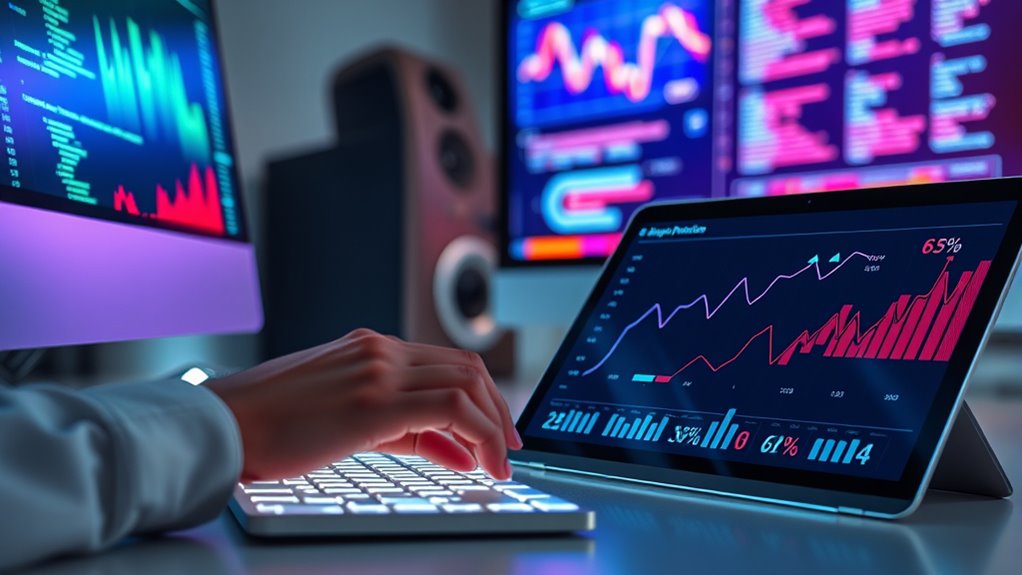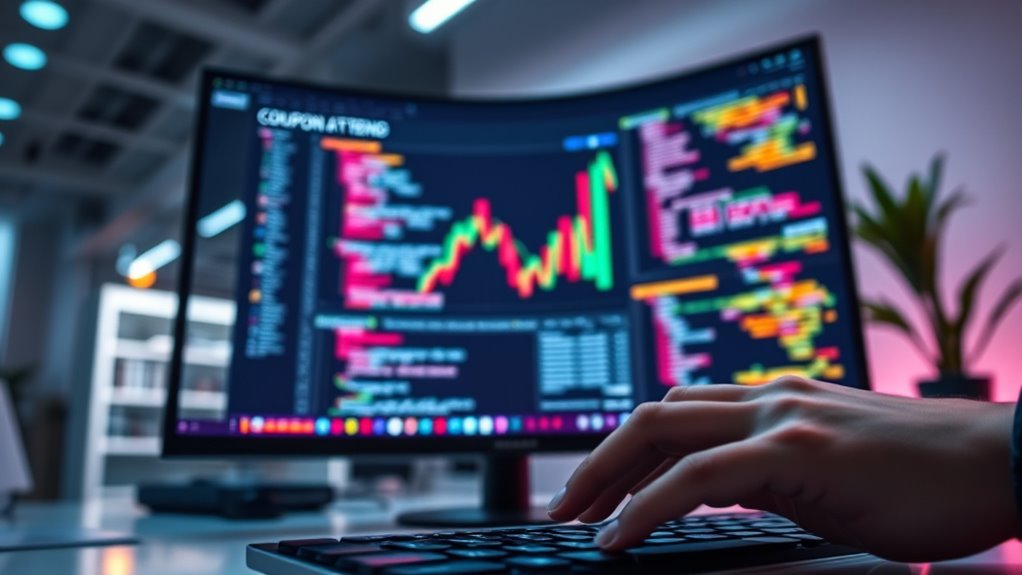AI algorithms now surpass humans in predicting effective coupon strategies by analyzing vast datasets and using advanced techniques like machine learning and natural language processing. They achieve up to 95% accuracy, improving promotional results and optimizing timing, discounts, and customer targeting. This allows bots to quickly adapt to market changes and maximize ROI. If you want to uncover how these intelligent systems can give you a competitive edge, keep exploring what they can do for your business.
Key Takeaways
- AI algorithms achieve up to 95% accuracy in sales and promotion forecasting, surpassing traditional methods.
- Advanced techniques like machine learning and NLP enable AI to predict optimal coupon strategies more precisely.
- AI can adapt in real-time, adjusting coupon offers based on consumer behavior and market trends faster than humans.
- Automated forecasting reduces errors and enhances decision-making efficiency compared to manual coupon planning.
- AI-driven insights help optimize promotional resources, giving bots a competitive edge over human-led strategies.

Artificial intelligence is transforming how retailers predict and optimize coupon strategies, leading to markedly higher accuracy and efficiency. With AI algorithms reaching up to 95% accuracy in sales and promotion forecasting, you can now make decisions that outpace traditional methods, which typically hover between 60% and 79%. This leap in precision isn’t just a matter of better numbers; it’s about understanding complex discount effects like cannibalization and halo impacts that conventional statistics often overlook. These models handle extrapolations beyond historical price ranges seamlessly, ensuring you don’t miss critical signals that could influence your promotional success. By integrating multiple variables—such as customer behavior, market trends, and supplier conditions—AI provides you with a thorough view of the factors driving sales, enabling automated order generation that ties directly into your enterprise resource planning (ERP) systems. This means fewer manual interventions, faster responses, and more accurate inventory management aligned with predicted demand. Accurate sales prediction is essential for optimizing promotional campaigns and minimizing waste. To achieve these impressive forecasts, AI leverages a variety of advanced techniques. Machine learning, deep learning, and natural language processing (NLP) work together to recognize intricate patterns in coupon effectiveness. Time series analysis helps you track seasonal trends and fluctuating market conditions, while sales pattern analysis uncovers hidden relationships across regions and customer segments. Additionally, NLP extracts sentiment from customer feedback, giving you insights into consumer preferences that refine targeting and coupon design. These combined approaches make your forecasts more reliable and adaptable, dynamically adjusting as new data flows in. Promotion optimization is another key benefit of AI. It analyzes historical consumer behaviors and sales patterns to determine the best timing and duration of discounts. Real-time monitoring allows you to shift strategies mid-campaign, responding swiftly to market shifts. AI also evaluates the effectiveness of various promotion mixes—such as discount types, bundles, or offers—helping you identify what resonates best with your audience. Scenario simulation tools enable you to test different coupon strategies before deployment, minimizing risk and maximizing impact. With resource constraints like budgets and manpower in mind, AI helps you allocate your promotional resources more efficiently, ensuring higher returns on your investments. Deploying AI solutions like Promo Forecast AI is designed to fit your operational environment. Whether hosted on secure cloud platforms or on-premise, these tools address data privacy concerns and integrate smoothly with existing ERP systems. This allows for automated purchase orders and stock adjustments based on accurate forecasts. The deployment process also considers complex factors like supplier delivery schedules, product expiry dates, and store capacities, making the solution adaptable to your specific needs. Furthermore, incorporating emotional support strategies can help retail teams better handle the stress associated with rapid decision-making and market fluctuations. Beyond coupon predictions, ongoing AI-driven insights guide broader business decisions, including inventory management and supply chain adjustments, helping you stay ahead in a competitive retail landscape.
Frequently Asked Questions
How Accurate Are AI Predictions Compared to Human Experts?
You might wonder how accurate AI predictions are compared to human experts. AI typically hits about 60% accuracy, especially in pattern recognition and data analysis, while humans range from 53% to 57%. AI outperforms humans in processing large datasets quickly, but humans excel in understanding context and adapting to changing situations. Combining both often yields the best results, leveraging AI’s speed and humans’ strategic insight.
What Types of Coupons Do AI Models Predict Best?
You might wonder which coupons AI predicts best. AI excels at behavioral-targeted coupons, time-sensitive discounts, and personalized product offers because it analyzes browsing, purchase history, and engagement patterns. It also effectively predicts dynamic pricing and churn-prevention discounts by continuously learning from real-time data. These types benefit from detailed user insights, allowing AI to deliver highly relevant offers that maximize redemption and profitability.
Can AI Adapt to Changing Coupon Strategies Over Time?
Think of AI as a skilled sailor adjusting to shifting winds; it can adapt to changing coupon strategies over time. You’ll find that AI continuously learns from new data, monitors market shifts, and refines its approach for maximum results. By instantly responding to consumer behavior and competitor moves, AI stays agile. This dynamic adaptability ensures your coupon campaigns remain relevant, effective, and ahead of the competition.
How Do Privacy Concerns Affect AI Coupon Prediction Models?
Privacy concerns impact your AI coupon prediction models by limiting the data you can collect, which reduces personalization accuracy. You might face stricter regulations, increasing operational costs and complexity. Consumers’ wariness to share personal info can hinder data availability, making it harder to build effective models. To succeed, you need transparency and strong security measures to gain trust, encouraging users to share data willingly while respecting their privacy.
What Industries Benefit Most From Ai-Generated Coupon Forecasts?
Think of industries as a garden where AI helps plants grow stronger. Retail and e-commerce thrive by personalizing offers, boosting sales, and reducing churn. Telecommunications cut costs and retain customers through targeted coupons. Travel and hospitality maximize bookings with demand-based discounts. CPG brands foster loyalty with tailored incentives. You benefit most when AI guides your promotional efforts, ensuring offers hit the right audience at the right moment, maximizing revenue and customer engagement.
Conclusion
In the end, AI-generated coupon predictions are like a sharp arrow hitting the bullseye—quick, precise, and increasingly effective. While bots may not fully replace human intuition, they’re closing the gap fast. As technology evolves, you’ll find yourself relying more on these intelligent systems to save money and stay ahead. It’s an exciting race where humans and bots team up, each pushing the other to become smarter and more efficient.









